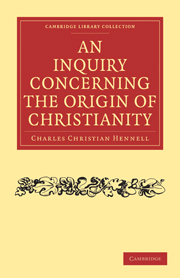Book contents
- Frontmatter
- PREFACE
- Contents
- ERRATA
- CHAPTER I Historical sketch, from the Babylonish captivity to the death of Jesus
- CHAPTER II Historical sketch, continued to the end of the first century
- CHAPTER III On the date and credibility of the Gospel of Matthew
- CHAPTER IV On the date and credibility of the Gospel of Mark
- CHAPTER V On the date and credibility of the Gospel of Luke
- CHAPTER VI On the date and credibility of the Gospel of John
- CHAPTER VII Examination of the accounts of the Resurrection and Ascension
- CHAPTER VIII Remarks on the other miracles in the four Gospels
- CHAPTER IX General objections to the miracles of Jesus
- CHAPTER X Remarks on the miracles in the Acts of the Apostles
- CHAPTER XI On the evidence afforded to the miracles by the apostolic writings
- CHAPTER XII On the prophecies
- CHAPTER XIII On the parts of Isaiah supposed to relate to Christ
- CHAPTER XIV On the book of Daniel
- CHAPTER XV Whether Jesus foretold his own death and resurrection
- CHAPTER XVI On the character, views, and doctrine of Jesus
- CHAPTER XVII Comparison of the precepts of Jesus with the Jewish writings
- CHAPTER XVIII Concluding reflections
- APPENDIX
CHAPTER XII - On the prophecies
Published online by Cambridge University Press: 05 March 2012
- Frontmatter
- PREFACE
- Contents
- ERRATA
- CHAPTER I Historical sketch, from the Babylonish captivity to the death of Jesus
- CHAPTER II Historical sketch, continued to the end of the first century
- CHAPTER III On the date and credibility of the Gospel of Matthew
- CHAPTER IV On the date and credibility of the Gospel of Mark
- CHAPTER V On the date and credibility of the Gospel of Luke
- CHAPTER VI On the date and credibility of the Gospel of John
- CHAPTER VII Examination of the accounts of the Resurrection and Ascension
- CHAPTER VIII Remarks on the other miracles in the four Gospels
- CHAPTER IX General objections to the miracles of Jesus
- CHAPTER X Remarks on the miracles in the Acts of the Apostles
- CHAPTER XI On the evidence afforded to the miracles by the apostolic writings
- CHAPTER XII On the prophecies
- CHAPTER XIII On the parts of Isaiah supposed to relate to Christ
- CHAPTER XIV On the book of Daniel
- CHAPTER XV Whether Jesus foretold his own death and resurrection
- CHAPTER XVI On the character, views, and doctrine of Jesus
- CHAPTER XVII Comparison of the precepts of Jesus with the Jewish writings
- CHAPTER XVIII Concluding reflections
- APPENDIX
Summary
Some of the incidents in the life of Jesus appeared to agree with detached sentences in different parts of the Jewish scriptures. This confirmed the belief of his disciples, that he was, as he claimed to be, the Messiah whom those scriptures foretold. And returning to them with this prepossession, they were able, by straining the facts a little on one side, and the meaning of their scriptures on the other, to find in almost every page some fresh coincidences. A new and intense interest was thus imparted to the revered but familiarized writings; words and sentences, fallen through the lapse of time into dry forms, were vivified by the discovery of a mysterious connexion with present things; coincidences the most doubtful were magnified into fulfilled prophecies; and imagination found abundance of connexions which common sense alone would never have discovered.
From the confidence and frequency with which the Apostles directed inquirers to search the Scriptures for the evidence of the Messiahship of Jesus, it seems clear that they relied upon the fulfilment of prophecy as their strongest argument.
These arguments of the Apostles were addressed chiefly to Jews. But since we are able to read the Jewish scriptures as well as the Jews of that time, we can put ourselves into the same position for feeling and appreciating the force of an argument on which the Apostles laid so much stress. Let us, then, for a time imagine ourselves in the place of the Jews of Berea, and follow the Apostle's urgent exhortation to search the Old Testament whether these things were so, i. e. whether Jesus of Nazareth was he of whom Moses and the prophets wrote.
- Type
- Chapter
- Information
- An Inquiry Concerning the Origin of Christianity , pp. 216 - 242Publisher: Cambridge University PressPrint publication year: 2010First published in: 1838



